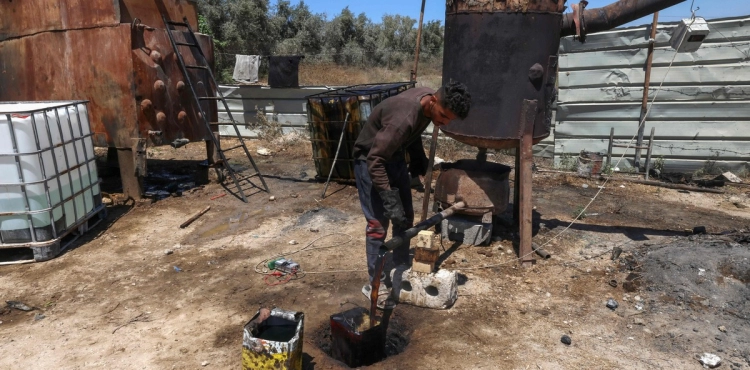Mahmoud al-Kafarneh asks one of his workers to light more firewood under a tank filled with about a ton of plastic in order to melt it and turn it into fuel that he sells in the local market in the besieged Gaza Strip , which is witnessing an energy crisis that leads to an increase in its prices while its residents prepare One of the poorest in the world.
Al-Kafarneh, 25, works in Jabalia, near the northern border with Israel, with his brothers in the project, whose idea is to recycle plastic by melting it under very high temperatures.
The smelting process takes a long time, especially to fill the tank, which has a capacity of one and a half tons of plastic, which is enough to produce a thousand liters of fuel .
In front of the tank located in open ground east of Jabalia refugee camp in the northern Gaza Strip, Al-Kafarneh says that "the idea came from the Israeli blockade of the Gaza Strip, which has been going on since 2007, and which led to a renewed fuel crisis affecting the electricity sector."
"We adopt a primitive method and simple homemade equipment," the young man, who holds a Bachelor of Business Administration, added, explaining that he used the Internet to develop his idea, and in 2018, "several failed experiments before I was able, after eight months, to extract fuel."
He added, "The tank does not hold more than a ton and a half of plastic, while the fuel extraction process lasts for 12 to 14 hours."
The recycling process goes through several stages before it can be repeated, as it needs at least eight hours to cool down and clean the tank.
The molten plastic evaporates in the first stage before condensing it by cooling it with water to obtain fuel. The mud-coated tank to ensure heat preservation is connected to a pipe connected to another tank containing water.
The second tank condenses the steam, which in turn turns into fuel, which is bottled in gallons through a faucet on the side of the tank.
The work team separates the gasoline from the diesel through another device.
Al-Kafarneh does not acknowledge the existence of any health or environmental risks for the project in which the workers do not use any of the safety means. "There are no risks and the area is considered industrial and devoid of population," he said.
On the other hand, the director of the National Institute for Environment and Development, Ahmed Helles, confirmed that "the phenomenon is catastrophic and indicates complete chaos and is not based on any environmental controls, standards or oversight."
Helles stressed that "the chemicals that result from burning plastic are purely toxic, and inhaling them is a direct and definitive cause of the spread of diseases, especially lung cancer," criticizing the project´s reliance on a "random and primitive method that causes very great harm to workers and the entire population."
He added that "the used tank itself is considered a time bomb in which an explosion can occur, and this has dire consequences."
But Al-Kafarneh is convinced that the project will help produce a large amount of gas as well. At the same time, he admits, "We do not know how to use the gas, so we evaporate it by placing it in water so that it does not affect the environment."
The young man stresses the impact of the Israeli blockade on the Gaza Strip and on his work. "The thermal tank can be dispensed with (and the use of) an electrically powered tank that absorbs a larger quantity and can withstand more heat, but it is not available due to the Israeli blockade," he said.
Israel destroyed the only power plant in Gaza in 2006. Since then, the residents of the Strip suffer from a severe electricity crisis, with electricity cuts for more than 12 hours a day.
On the quayside of the Gaza port for fishermen, fisherman Abdel Moati Al-Habil, 23, fills with a plastic hose the fuel tank of his old boat with diesel extracted from plastic, explaining that he uses this substance because its price is "half the cost of diesel imported from Israel."
The young man, whose 12-hour fishing trip requires 900 liters of diesel per day, added that "there are no defects in this diesel, its quality and efficiency are high." He points out that seven other boats use this type of diesel.
But he feels "regretted that the quantities extracted from plastic are few and limited", stressing that he does not get more than 500 liters every two days.
The volume of fuel production depends mainly on the amount of plastic containers collected from the garbage, according to Al-Kafarna, who says, "We produce from 700 to 1,000 liters of diesel per day."
In an area hundreds of meters from the border with Israel east of Jabalia refugee camp, six workers sort empty plastic containers up to ten meters high in a plastic garage.
One of these workers, Imad Hamed, explains, "We buy plastic from workers who collect it from the streets, then sort it before grinding it with a special electric machine, so that it becomes like fine grains of rice."
He continues, "We put the extracted materials in bags and then sell them to owners of factories and workshops specialized in recycling plastic."
Hamed complains about the impact of the electricity shortage crisis that the Gaza Strip suffers from on the continuation of his work, noting, "Sometimes we have to work at night when the electricity supply is connected."
He adds that "the work is hard (...) but the risks left by the Israeli bombing in Gaza are greater than the dangers of our work."
Two weeks ago, the Gaza Strip witnessed a round of violent military confrontation that lasted three days between Islamic Jihad and Israel, which erupted following Israel´s assassination of one of the Jihad´s military leaders.
Gaza..A citizen succeeds in extracting fuel from plastic












